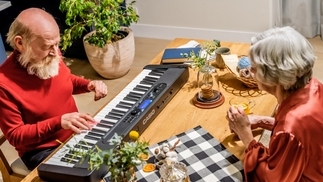Music helps resistance against Alzheimer's and dementia, new study finds
Researchers at the University of Utah are considering developing music-based treatments for dementia-suffering patients...

Music helps with Alzheimers and dementia, a new study has found, as well as triggering that feeling of being "buzzed" or moved.
What's called the salience network of the brain is linked to Autonomous Sensory Meridian Response (ASMR). Although ASMR has become popular through videos featuring the sound of people doing everyday things like breathing, it's also synonymous with the joy, thrill and calm which all kinds of melodies afford people, whether that's soothing jazz or blaring 140 bpm techno.
ASMR also diarises our favourite music, the melodies that click most beautifully with us, so that each time we hear them that sensory response is retriggered; which, according to The Journal of Prevention of Alzheimer’s Disease, means that our favourite music can be used as a weapon against the tragic, memory-distorting effects of Alzheimers disease and dementia. It numbs anxiety for patients.
Jeff Anderson M.D. P.H.D., associate professor in radiology at the University of Utah, believes music can act as an effective treatment for sufferers of the illness: "We believe music will tap into the salience network of the brain that is still relatively functioning."
A graduate student in the Brain Network Lab, Jace King, added quite poetically to this theory, that "When you put headphones on dementia patients and play familiar music, they come alive[...] Music is like an anchor, grounding the patient back in reality."

